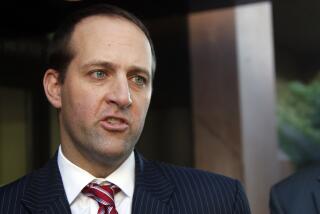Rickover Censure Follows Long, Stormy Career
- Share via
WASHINGTON — He has been called, justifiably, the “father of the atomic submarine,” a wizened, irascible man who made himself a national institution by challenging the Establishment--as often as not the Navy and its relationship with the contractors that built its ships.
But on Tuesday, little more than three years after he was sent into retirement, Adm. Hyman G. Rickover, 85, was censured by the secretary of the Navy for taking $67,000 worth of gifts from General Dynamics Corp., whose Electric Boat Division built most of the nuclear submarines that Rickover for years treated as his own.
Navy Secretary John F. Lehman Jr. called it “the maximum punitive action” available against the old officer who had, at the behest of Congress, remained on active duty 25 years after he was first passed over for promotion to admiral.
Rickover not only oversaw development of the reactors that powered U.S. nuclear submarines, he also managed the construction of the first U.S. nuclear electric plant at Shippingport, Pa. For years, he personally selected the submarine officers sent into training to command vessels in the nuclear fleet.
Among the young officers who passed Rickover’s scrutiny was former President Jimmy Carter.
Rickover first achieved public prominence when his allies in Congress forced the Navy to promote him to rear admiral after it appeared that he was headed for retirement as a captain. He became a full four-star admiral in 1973, at the age of 73.
Although he was revered on Capitol Hill, where he delighted committees with his criticism of military brass and defense contractors, Rickover’s list of adversaries grew longer each year.
There were continuing attempts to force him into retirement, military superiors criticizing him on both technical grounds and for his abrasive style of leadership. Adm. Elmo Zumwalt, as chief of naval operations, contended that Rickover had become a major obstacle to the modernization of the fleet. Rickover feuded privately with top civilian officials of the Pentagon as well. But whenever he encountered rough seas, his allies in Congress rallied to his side.
Indeed, when he retired after 64 years in uniform, he said his farewell not at the Pentagon, but on Capitol Hill before the Joint Economic Committee.
Hours after his censure was announced Tuesday, Rickover issued a statement saying: “My conscience is clear. I have always acted in the best interest of the Navy and my country during my 64 years of military service. No gratuity or favor ever affected any decision I made. The record shows that I have been consistently tougher on contractors than any government official at any time.”
More to Read
Get the L.A. Times Politics newsletter
Deeply reported insights into legislation, politics and policy from Sacramento, Washington and beyond. In your inbox twice per week.
You may occasionally receive promotional content from the Los Angeles Times.










